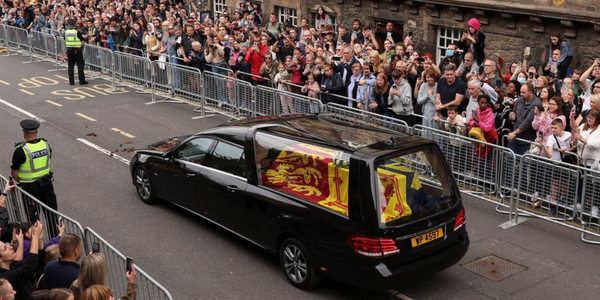Hospitality industry scholarship winners gain insight into the Royal kitchens
He’s not public school, he’s not ex-military. The son of a builder, he went to comprehensive school. And he’s the Queen’s Chef. “I did everything I could to get out of school as quickly as possible,” said Mark Flanagan. “But I knew there were two things that I enjoyed; travel and cooking.”
The cooking came from his mum, who got him to peel the potatoes when he came home from school. “I had no idea or ambition that I would be head chef at Buckingham Palace. But that just goes to show what this industry can offer, everybody,” he said.
At 16, he got a job with Guinness at one of their breweries: “There was an opportunity of an apprenticeship there; they were a very forward thinking company, even back then. They taught us life skills and put us on a vocational career path. It was a tremendous opportunity for me.”
Flanagan worked hard, aiming for an apprentice chief’s position, but it wasn’t to be; the company wanted him to do a year of academic study, but he had already had enough of that so he enrolled himself in catering college, in Slough. His goal was to open a builders’ ‘caff’. “Things have turned out differently,” he said.
Hard work, never giving up, not taking no for an answer led him to become executive chef at Wentworth Golf Club and to work for the legendary chef and restaurateur Albert Roux, who eventually put him forward for the job at the Palace in 2001.
Flanagan is often asked what the Queen’s favourite meal is, and he politely demurs (although former Royal chefs told The Daily Telegraph last year: “Fillets of beef and venison from Sandringham and Balmoral are turned into Gaelic steak, served with a sauce of mushroom, cream and whisky. She enjoys a Sunday roast after church. She relishes the strawberries grown at Balmoral, and the sweet-scented, white peaches that are nurtured in her greenhouses at Windsor Castle).
But he does disclose that he was at a school once and pupil got up to ask: “Does the Queen eat kebabs?” “Not on my watch!” said Flanagan. He was speaking to packed audience at Glasgow’s Grand Central Hotel earlier this year, attending the Hospitality Industry Trust (HIT) Scotland’s Emerging Talent Conference.
Flanagan gave an insight into the daily life of the Palace kitchens; a 50-strong food department, 21 chefs, 500 staff lunches, six or seven events attended by between 20 and 250 people, two state banquets a year for 180 people each. He spoke fondly of the annual decamp to Balmoral and of the Scottish produce used in all the Royal kitchens.
“One lesson I learned pretty quickly,” he said, “was not to assume the most important meal being served is the Queen’s; rather, the Queen regards the most important meal is the staff’s.”
The Emerging Talent Conference also saw the award of 179 scholarships to people working in the industry, covering a wide range of experiences including a pastry master class in Andrew Fairlie’s kitchen in Gleneagles, a spell at the Jumeirah Beach Hotel in Dubai and attendance at the Ecole hôtelière de Lausanne in Switzerland.
“Our scholars tell us how motivational these awards are; they can be life-changing,” said David Cochrane, HIT Scotland chief executive. The scholarships are worth more than £1m, in opportunities given in kind by the industry and the value of the experience gained that is reinvested. Of this year’s scholars, 56% were women and 37% over the age of 30.
“There is a very a healthy gender balance, and although we speak about ‘emerging talent’, we are not just a young people’s charity,” said Cochrane. “The scholarships really demonstrate the diversity of our industry and the opportunities it offers.”



![GLITZ, GLAMOUR, AND FABULOUSNESS: ST JAMES QUARTER CELEBRATES PRIDE WITH DAZZLING DRAG QUEEN APPEARANCES, GIVEAWAYS AND TOP LGBTQIA+ DJ! St_James_Quarter_(600×300)[1]](https://eventsbase.co.uk/wp-content/uploads/2023/06/St_James_Quarter_600x3001.png)
